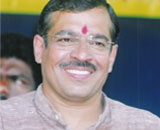
Vidhayak Sansad has its roots in Dahisar, a small village in Thane district approximately 70 kilometers north of Mumbai. It was here that Vivek’s, one of Vidhayak Sansad’s founders’ maternal uncle lived. When here, they learned that the local school was closing because so many children were dropping out. They decided to move there and take up welfare activities for the poor. The couple started pre-school classes, set up a medical center, and tried to spur economic activity by rearing pigs and goats. Everyone in the village, from the lowest to the highest castes, supported their work.
But when they organized sports tournaments for young people in the village they noticed that some of the tribal youth didn’t always come to the practices. When the Pandits asked them why, they discovered that these tribals had lived for years in forced servitude to repay small loans to local landlords. The practice was illegal, but the poor lived in ignorance of the law. Outraged by what they encountered, the Pandits began speaking against the illegal practice of bonded labor. But the laborers were too scared and suspicious to approach them. The couple also faced violent opposition from landlords. Then one night in February 1982, a band of landowners led by Vivek’s uncle beat the couple before the village. The tribals took them in that night and put their faith in them.
Over the past 29 years Vidhayak Sansad has worked in the release and rehabilitation of 5,000 bonded laborers.
Once these laborers declared themselves free, they discovered that they were outcastes in the community. Without skills, land, or government support, they faced serious challenges in making a living. Vidhayak Sansad assisted them in organizing co-operative farms on hired or donated land. The organization set up a revolving credit fund that allowed farmers to purchase seeds, fertilizer and insecticides. Experts provided technical advice. A grain bank allowed the poor to take interest-free loans of grain during lean periods, when they would have otherwise had to borrow from landlords at extortionate rates. All of these measures helped free bonded laborers get on their feet. Eventually many of the programs ended as the former bonded laborers learned to become successful farmers or found work again in the landlords’ fields.
The organisation has evolved its programs in recent years as the scourge of bonded labor has waned in Thane District. It now focuses on creating new models for elementary rural education, increasing the capacity of the poor to combat human rights abuses, and developing new livelihood opportunities in agriculture and related fields. As part of its human rights program, the organization carries out regular training camps for vulnerable groups and social service organizations. These have had a strong impact on empowering the rural poor of Maharashtra to prevent atrocities. Their educational initiatives focus on bringing education to those with the least access to it.
The organization has established a residential school for girls of the Katkari tribe, which has a female literacy rate close to zero. It has also set up a group of schools for the children of migrant brick kiln workers in Thane District. In agriculture, it is now engaged in a jatropha cultivation program to support poor farmers. The jatropha plant’s seeds produce an oil that when refined can serve as a rich bio-fuel.
All of these activities are carried out from Vidhayak Sansad’s tree-covered, seven-acre campus in the small village of Usgaon, sixty kilometers north of Mumbai. The campus regularly receives visits from students of social work at reputed institutions, Indian Administrative Service probationers, and representatives from international aid organizations.
Established in 2000, Give is the largest and most trusted giving platform in India. Our community of 2.6M+ donors have supported 2,800+ nonprofits, impacting 15M+ lives across India.
Discover more from
Subscribe to get the latest posts sent to your email.

